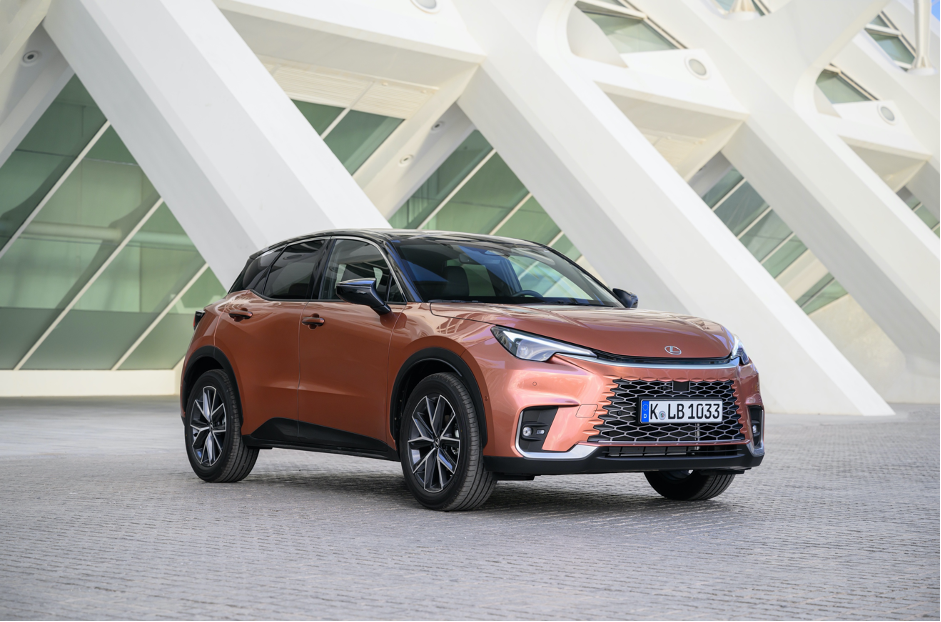Lexus LBX: Lexus’ Entry-Level Compact SUV

The Lexus LBX arrives with an ambitious proposition in the premium urban SUV market. Successor to the Yaris Cross and built on the same platform, it stands out with its refined design and hybrid powertrain. Designed for demanding urban drivers, this compact SUV combines comfort, technology, and fuel efficiency. After spending a week behind the wheel, here is our review of this model that aims to blend luxury with environmental responsibility.
Dimensions and Exterior Design
Measuring 4.19 meters long, the LBX fits into the urban SUV category, with dimensions that make it ideally suited for the narrow streets of many European cities. Compared to the Yaris Cross, it is slightly wider by 6 cm and 35 mm lower, giving it a more dynamic silhouette and a more commanding stance. With its clean lines and sleek style, it distinguishes itself from other Lexus models with a modern front end, featuring a frameless grille that adds a touch of subtlety and refinement. Both the interior and exterior design emphasize discreet elegance, marking a more contemporary Lexus signature.

Interior Design and Ergonomics
The interior of the Lexus LBX is a model of refinement and elegance. The carefully crafted furnishings provide a luxurious ambiance, with high-quality materials, stitching on the dashboard, and suede seats. The ergonomics are centered around the driver, with a « Tazuna » design where all controls are intuitively accessible, allowing for a comfortable driving experience without unnecessary movements. However, space in the rear is limited, and although the materials are high-end, the multimedia system feels a bit dated compared to the rest of the cabin. The system’s responsiveness is also lacking, and the interface is not as intuitive as one might hope.


Different Powertrains
The Lexus LBX offers a single hybrid powertrain combining a 1.5-liter, three-cylinder gasoline engine with an electric motor for a total output of 136 horsepower. This engine is paired with a continuously variable transmission (CVT), which, while offering smooth city driving, sometimes generates a whirring noise during acceleration. However, this powertrain is ideal for urban commutes, with electric-only driving phases that allow for a few kilometers of emission-free driving. The sole hybrid version offers a combined fuel consumption of 4.3 liters per 100 km, making it an extremely economical choice for eco-conscious drivers.
Driving Experience
The driving experience in the LBX is marked by pleasant and comfortable handling. The vehicle adapts well to urban conditions, offering precise steering and smooth driving. The suspension system keeps body movements well-controlled without making the ride overly soft. However, accelerations can be a bit noisy, especially during quick starts where the engine struggles to remain unobtrusive. Nonetheless, driving remains smooth thanks to the hybrid system, and the LBX excels in urban settings where it shines with its maneuverability and relative quietness in electric mode. On the highway, it also proves stable and composed, though its performance remains modest.

Comparison with Competitors
The LBX competes in a competitive market against models like the MINI Countryman, Audi Q2, and Volvo EX30. Compared to these models, the Lexus LBX offers an attractive value-for-money proposition, though its price is higher than a base Yaris Cross. This model will appeal to those seeking a premium urban vehicle with luxury features, while offering the reliability of a hybrid powertrain already proven in other Toyota models. However, if performance and rear-seat space are higher priorities, rivals like the Audi Q2 or BMW X1 may be more suitable.
Price in Belgium
The Lexus LBX starts at €34,320 for the base versions and can go up to €40,500 for the higher trims. This price places it in the premium urban SUV range, costing more than most of its direct competitors, but justified by the quality of its equipment and hybrid powertrain.
Conclusion
The Lexus LBX is a successful choice for those seeking a small urban SUV with refined luxury and moderate fuel consumption. Among its strengths, its elegant design, efficient hybrid powertrain, and driving comfort stand out. The interior is well-equipped, though the multimedia system could use improvement. Its power performance is modest, but suited for city driving. On the downside, rear-seat space is limited, which may be a downside for families. If you’re looking for a premium alternative to more common models like the MINI Countryman or Audi Q2, the Lexus LBX might just meet your expectations.

Pros:
- Refined and modern design
- Excellent fuel efficiency
- Top-notch comfort and ergonomics
- Hybrid powertrain well-suited for urban commutes
Cons:
- Dated and unresponsive multimedia system
- Limited rear-seat space
- Modest performance on highways
